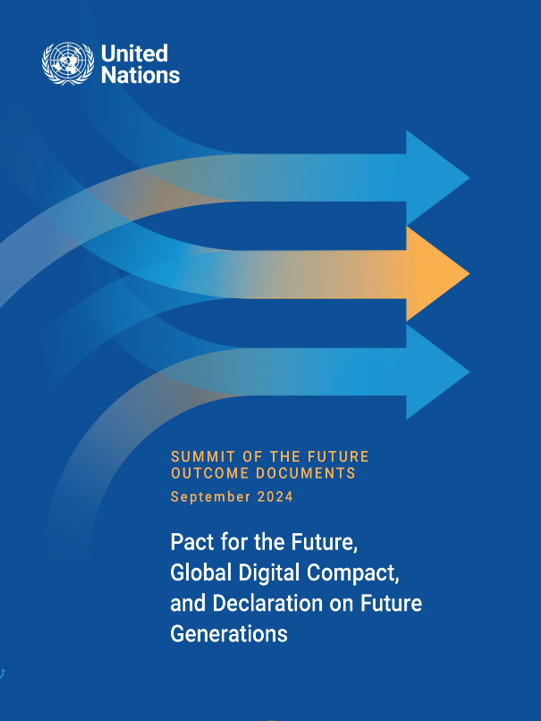Summit of the Future:
Are We Moving Forward?
Today, September 23, 2024, marks a significant moment in human history with the signing of the UN Pact for the Future, a global agreement outlining the collective goals and objectives necessary for addressing sustainability issues. The UN Summit of the Future brings the world together under one unifying vision: to secure a sustainable future for all. The agreement adopted today cannot be just another bureaucratic initiative—it must represent a sincere collective decision to effectively address the urgent crises we face as a global community.
A Long Time Coming
For years, we have witnessed the creation of ambitious international agreements meant to tackle environmental degradation, inequality, and global poverty, only to see these goals fall short of their intended impact. According to the 2024 UN SDG Progress Report, only 17% of the Sustainable Development Goals (SDGs) are on track, with a worrying number of key objectives falling behind. This underscores the urgency of this new agreement.
Are We Ready for Systemic Change?
One of the biggest questions surrounding this pact is whether world leaders and corporations are truly ready to implement the systemic changes necessary to meet the goals outlined. The 56 action items detailed in the agreement address every aspect of sustainability—from poverty eradication to climate change mitigation. The top 10 actions, which represent the backbone of this new agreement, demand global commitment and integrity in implementation. These actions are our roadmap for transformation.
These considerations help determine the feasibility and robustness of the decision. For example, in pursuing a sustainable business initiative, rationality demands a thorough analysis of the project’s viability, resource allocation, and potential risks. It involves assessing whether the organization is capable of seeing the project through to successful completion.
The First 10 Action Items: Our Hope for a Sustainable Future
- Bold, Ambitious Action for the SDGs
The first action calls for bold, transformative steps to implement the 2030 Agenda and achieve the Sustainable Development Goals (SDGs). This means no longer treating sustainability as an optional initiative but integrating it into every policy and decision-making process. - Eradicating Poverty
Poverty remains one of the most pressing global challenges, and this action places it at the center of efforts to achieve the 2030 Agenda. We cannot hope for a sustainable world when billions of people remain trapped in poverty, unable to access basic resources. Addressing poverty is not just a humanitarian issue; it is the key to unlocking progress across all the SDGs. - Ending Hunger and Food Insecurity
This action aims to eliminate hunger and malnutrition—a goal that has eluded us for far too long. Achieving food security requires sustainable agricultural practices, fair access to resources, and the elimination of food waste. - Closing the Financing Gap
A persistent challenge is the lack of financial resources to support sustainable development in developing countries. The commitment to closing this financing gap is crucial to ensuring that no country is left behind in the pursuit of the SDGs. - Sustainable Multilateral Trading Systems
Trade has the power to fuel sustainable development if used responsibly. This action underscores the need for a multilateral trading system that promotes fairness, sustainability, and development, especially for poorer nations. - Investing in People to End Poverty
Action 6 calls for investment in human capital, emphasizing the need to strengthen trust and social cohesion. In doing so, we can address poverty more effectively by focusing on education, job creation, and social inclusion. - Building Peaceful and Inclusive Societies
The agreement recognizes that sustainable development cannot be achieved without peace and justice. Building inclusive institutions and providing access to justice for all is a cornerstone of achieving the SDGs and ensuring stability in societies. - Achieving Gender Equality
Gender equality is central to achieving the SDGs, and this action item highlights the importance of empowering women and girls to contribute meaningfully across all sectors. Gender equality isn’t just a goal in itself; it’s a driver of progress in health, education, and economic development. - Addressing Climate Change
Climate change remains the existential crisis of our time. The agreement calls for strengthened action to mitigate the impacts of climate change, ensuring that nations take concrete steps to reduce emissions and build resilience. - Restoring and Protecting the Environment
This final action emphasizes the need to accelerate efforts to protect and sustainably use natural resources. Our oceans, forests, and ecosystems are under unprecedented stress, and restoring these environments is essential for the survival of future generations.
The Need for Integrity and Accountability
While this agreement offers hope, the success of these initiatives will depend on two critical factors:
- Respecting and Empowering the UN’s Role in addressing international sustainability issues, backed by strong compliance measures to ensure global accountability.
- Acknowledging the Reality of the Threats We Face—from climate change to inequality—and eradicating any denial or resistance that stands in the way of action. The evidence is overwhelming, and inaction is no longer an option.
No More Denial or Apathy
The evidence of our global challenges is not confined to scientific reports or policy documents; it’s visible in our daily news cycles, from the rising number of natural disasters to growing social inequalities. The time for denial has passed, and the time for action is now.
Moving Forward Together
As we reflect on today’s agreement, it is essential to hold our leaders accountable for delivering on these promises. But accountability does not rest solely with governments or corporations—it rests with all of us. We, the global citizens, must engage in discussions, support sustainability initiatives, and challenge apathy wherever we find it.
The Sustainability Made Easy program offered by A4C provides an opportunity for individuals, organizations, and communities to get involved in constructive dialogue and action. This is our chance to move forward together, ensuring that today’s agreement leads to a truly sustainable future for all.
Tony Redman

